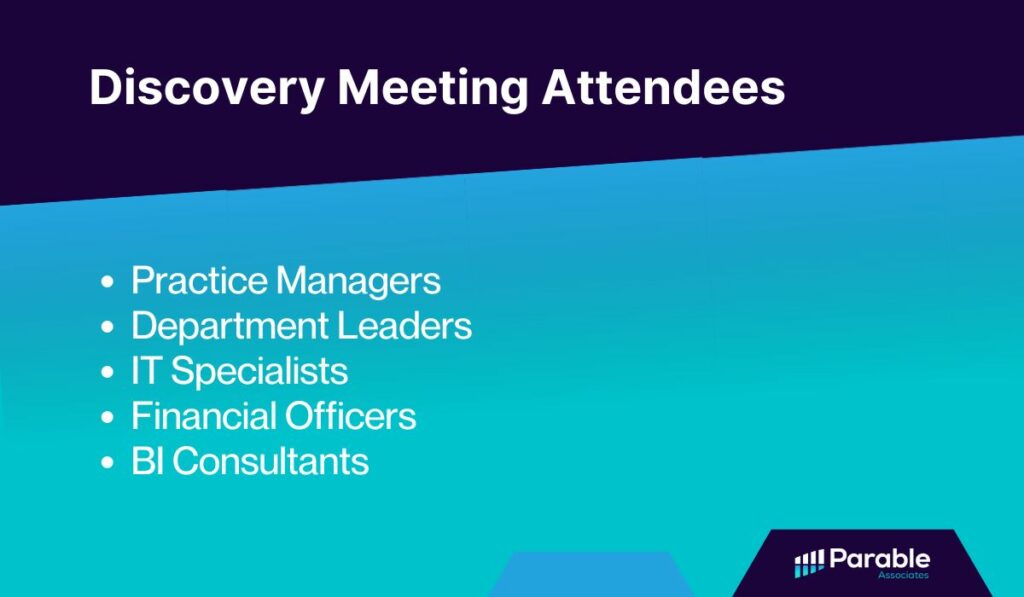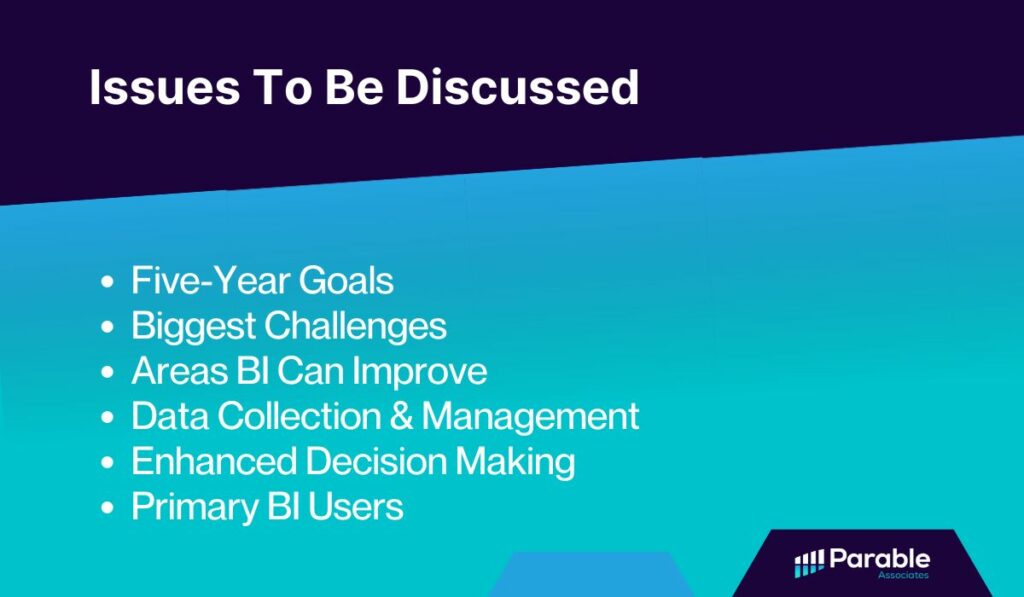Business intelligence (BI) is transforming the landscape of healthcare management by providing critical data-driven insights that can significantly enhance practice performance. These insights can drive improvements across multiple facets of practice operations, from boosting operational efficiency to accelerating the revenue cycle. However, the successful implementation of BI solutions extends beyond merely purchasing and installing off-the-shelf software. It requires careful planning, starting with an essential phase known as the discovery meeting.
What is a Discovery Meeting?
A discovery meeting is the first step in the BI implementation process, serving as a foundational meeting where the BI project’s objectives, expectations, and scope are clarified and documented. This meeting is crucial because it ensures that the BI solution is perfectly aligned with the specific needs and goals of the healthcare practice. During this meeting, stakeholders discuss current challenges, desired outcomes, and the functionalities needed from the BI system to ensure it delivers valuable insights.
The primary purpose of the discovery meeting is to gather comprehensive information that will guide the development of the BI solution. It’s about understanding where the practice stands in terms of data utilization and where it aims to go with the help of BI tools. This meeting sets the tone for the project and establishes a clear roadmap for both the BI team and the healthcare practice.

Who Should Attend the Meeting?
The effectiveness of the discovery meeting largely depends on the involvement of key personnel from the practice. The attendees should include:
Practice Managers
Practice Managers play a crucial role in the discovery meeting due to their comprehensive understanding of the daily operations and administrative challenges of the healthcare practice. Their insights are invaluable as they navigate the front lines of practice management, dealing with everything from staff scheduling to patient billing. Practice Managers can provide practical perspectives on what is needed from the BI tool to streamline operations, enhance patient satisfaction, and improve administrative efficiency. Their input helps ensure that the BI solution aligns with the operational realities and needs of the practice.
Department Leaders
Department leaders, including chief physicians, head nurses, and billing department managers, are critical participants in optimizing the administrative and operational facets of a healthcare practice. Their deep understanding of various departmental functions enables them to identify key areas for improvement, such as efficient billing practices, managing peak time scheduling, and enhancing information collection at check-in. Their insights are vital for tailoring the BI implementation to address these specific operational needs effectively.
IT Specialists
IT Specialists are key to the successful implementation of BI tools due to their expertise in handling the technical aspects of the system. Their role involves managing data integration, ensuring system compatibility, and addressing the technical challenges that may develop during the implementation process. IT Specialists help bridge the gap between the capabilities of the BI software and the existing IT infrastructure of the practice. Their technical insights ensure that the BI system is seamlessly integrated, securely handled, and optimally configured to support the practice’s data needs without disrupting existing workflows.
Financial Officers
Financial Officers are responsible for the financial management of the practice, making their input crucial in outlining the financial reporting needs and performance metrics that the BI system should address. They can provide detailed information on financial processes, areas needing cost control, revenue optimization, and compliance with financial regulations. Financial Officers ensure that the BI tool is equipped to deliver detailed and actionable financial reports that aid in better financial planning, budgeting, and forecasting, thus supporting the practice’s financial health and strategic financial decisions.
BI Consultants
BI Consultants are the architects of the BI solution, bringing expertise in business intelligence that is tailored to the healthcare industry. They play a pivotal role in developing and implementing the BI system, translating the practice’s data into actionable insights. BI Consultants collaborate closely with practice stakeholders to understand their specific needs and challenges, ensuring the BI tool is customized appropriately. They leverage their expertise to advise on best practices for data management, analytics, and visualization that meet the practice’s objectives, ensuring the BI system is not only functional but also strategic in driving business outcomes.
Each of these roles brings a unique and essential perspective to the discovery meeting, collectively ensuring that the BI implementation is comprehensive, integrated, and aligned with the strategic goals of the healthcare practice. Their combined expertise ensures that the BI system is not just a tool, but a transformative force within the practice.

What Questions Should Be Addressed?
The discovery meeting should be structured around key questions that uncover the depth and breadth of the practice’s needs. Some essential questions include:
Where do you want to take your practice in the next five years? Establishing a clear vision for your practice over the next five years is crucial for aligning the BI strategy with your long-term goals. Whether you aim to expand your services, increase patient satisfaction, or become a leader in your specialty, understanding these objectives ensures that the BI implementation will support your practice’s strategic direction and growth aspirations effectively.
What are the biggest challenges currently facing your practice? Identifying the most significant challenges that your practice faces is essential for customizing the BI solution to meet your specific needs. This could involve addressing inefficiencies in patient flow, reducing billing errors, or managing staff turnover. By pinpointing these pain points, BI features can be prioritized to directly tackle these issues, thereby enhancing overall practice performance.
What areas would you like to improve through BI? Determining the specific areas you wish to enhance through BI technology is key to tailoring the solution effectively. This could include streamlining operations to enhance efficiency or refining financial reporting for better financial health. Understanding these target areas allows for the development of a focused BI strategy that addresses your most pressing needs.
What data do you currently collect, and how is it managed? Analyzing the current data collection methods and management systems in place at your practice provides insights into the existing data landscape and what integration might be necessary. This information is vital to ensure that the BI system can seamlessly assimilate with your current operations without disrupting ongoing processes while making full use of the available data.
How do you see BI tools enhancing your decision-making processes? Exploring how BI tools can enhance decision-making involves considering the specific reports, dashboards, and insights that would most benefit your practice. This might include real-time data visualization for quick decision-making, predictive analytics for future planning, or automated reporting for regular updates. Clearly articulating these needs helps in designing a BI system that delivers actionable insights tailored to your requirements.
Who will be the primary users of the BI system? Understanding who the primary users of the BI system will be is crucial for ensuring that the interface and functionalities are user-friendly and relevant. Whether it’s administrative staff, physicians, or financial officers, each user group might have different requirements and comfort levels with technology. A user-centric design approach ensures that the BI system is accessible and valuable to all intended users, fostering widespread adoption and effective utilization.
These questions form the backbone of a productive discovery meeting, ensuring that the BI solution developed is not only customized but also targeted to meet the specific needs of the practice.
Achieve Practice Goals with a Custom BI Dashboard
Once the discovery meeting has clarified the needs and goals, the next step is to choose the appropriate BI solution and have a custom BI dashboard designed to help turn practice goals into reality. A well-designed dashboard can aggregate data from various sources, presenting it in an easy-to-understand format that highlights key metrics and trends. These dashboards provide real-time insights into operational performance, financial health, and patient care metrics, enabling timely and informed decisions.
Custom BI dashboards are developed with the end-user in mind, ensuring that they are accessible and intuitive, and provide relevant information at a glance. Whether it’s optimizing staff scheduling and training, improving patient billing practices, or accelerating the revenue cycle, these dashboards transform raw data into actionable intelligence that can drive growth and improve efficiencies.

Parable Associates – Your Partner in BI Implementation
At Parable Associates, we understand the unique challenges and needs of healthcare practices. We specialize in designing and implementing customized BI solutions that are not just about managing data but transforming it into actionable insights that drive decision-making and operational success. Our team of experts works closely with your practice from the initial discovery meeting to the final implementation, ensuring that your BI solution is tailored to meet your specific goals and challenges.
Let Parable Associates unlock the potential of your data, providing insights to improve practice management and optimize your revenue cycle. Schedule a discovery call today and take the first step towards transforming your practice with the power of business intelligence.
Discovery Meeting FAQS
This is the initial step in the Business Intelligence (BI) implementation process where key stakeholders from a healthcare practice come together to discuss, define, and document the objectives, expectations, and scope of a BI project. This crucial meeting ensures the BI solution aligns perfectly with the specific needs and strategic goals of the practice.
It sets the foundation for a successful BI implementation by establishing a clear roadmap that aligns with the practice’s goals and challenges. It facilitates understanding and communication among all stakeholders, which is crucial for customizing the BI solution to meet the practice’s specific needs and ensuring widespread adoption and utilization.
The meeting should include practice managers, department leaders, IT specialists, financial officers, and BI consultants. Each of these roles contributes essential insights, ensuring the BI implementation considers all aspects of the practice from operational to financial, enhancing the overall effectiveness and integration of the BI system.
Essential questions to explore include: What are the long-term goals for the practice? What are the current challenges that the practice is facing? Which specific areas could benefit from BI? What types of data are currently collected, and how is it managed? How can BI tools enhance decision-making processes? Who will be the primary users of the BI system?
A custom BI dashboard is designed to turn practice goals into tangible outcomes by providing a consolidated view of relevant data in an easily digestible format. These dashboards enable real-time monitoring of key performance indicators, and offer insights into operational performance, financial health, and patient care metrics, thereby supporting timely and informed decision-making.
Parable Associates specializes in customizing BI solutions tailored to the unique needs of healthcare practices. By partnering with Parable, practices benefit from our expertise in data management, dashboard creation, and BI strategy, ensuring seamless integration and maximization of the BI tool’s potential to enhance operational efficiency and financial performance.

